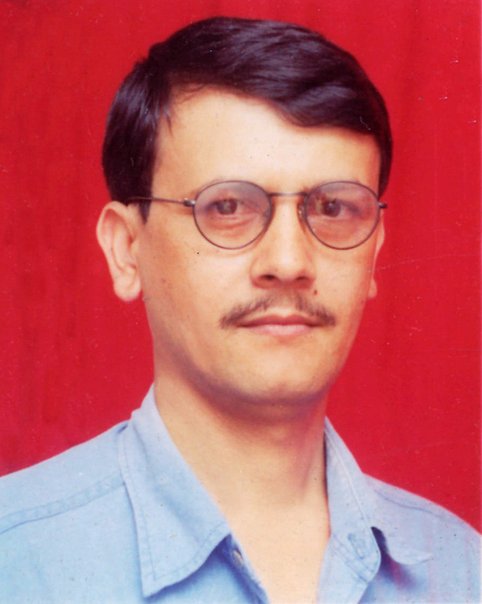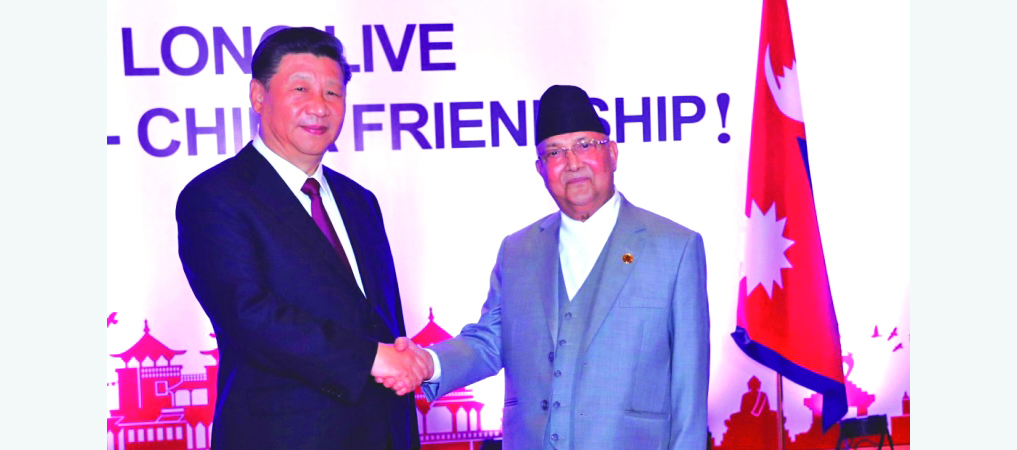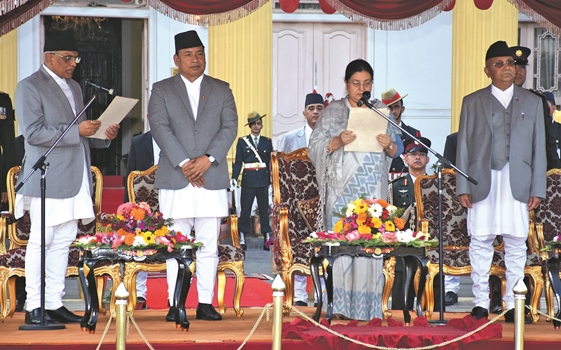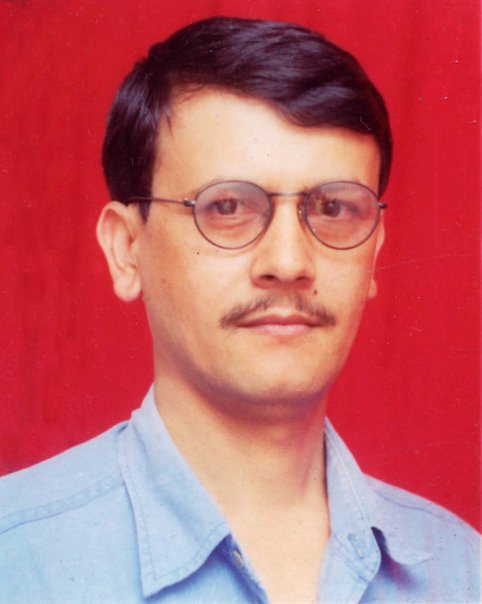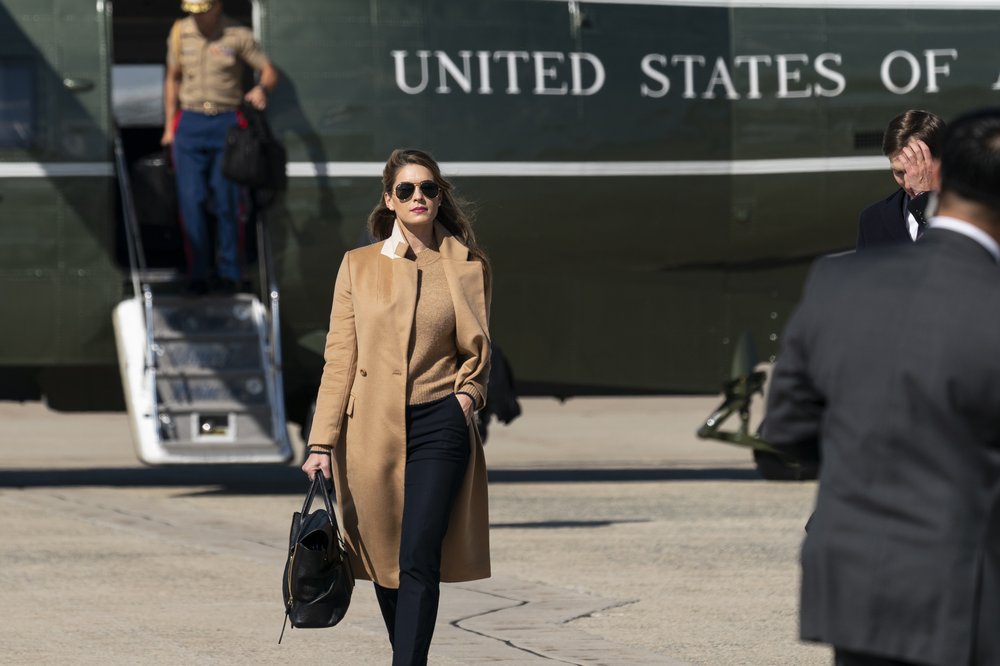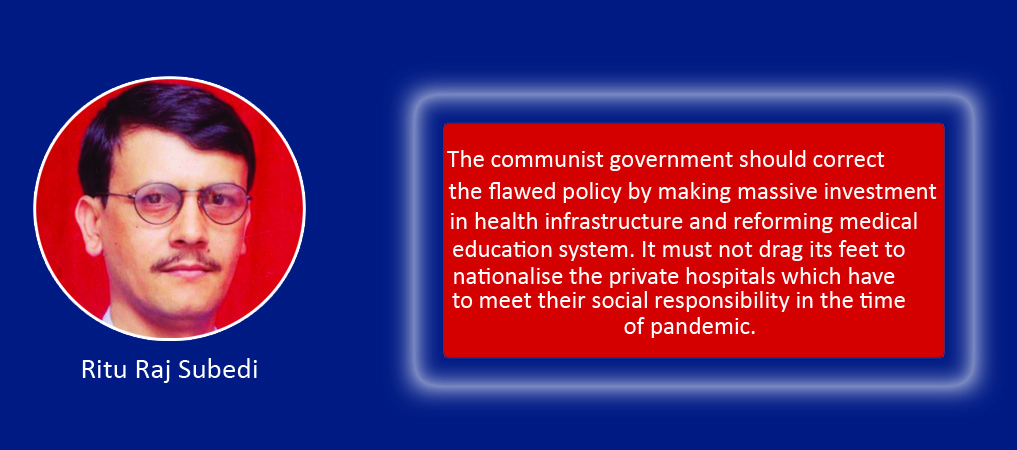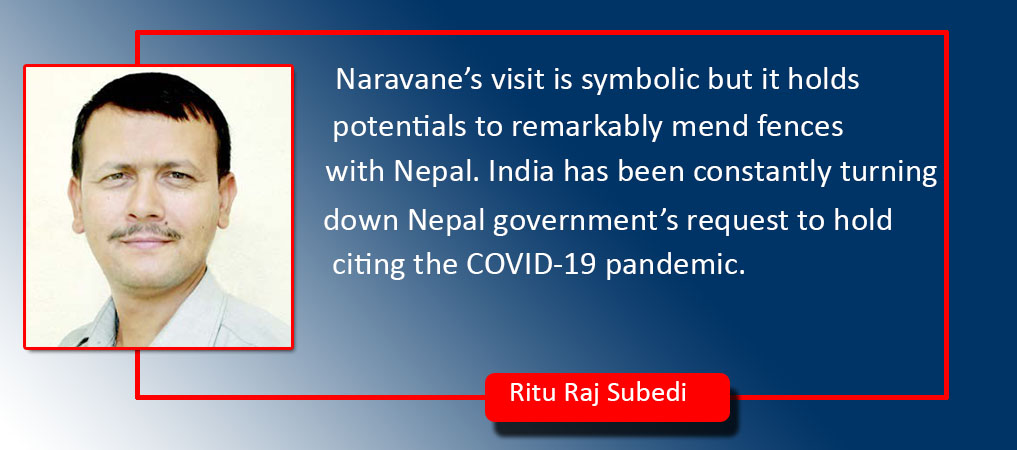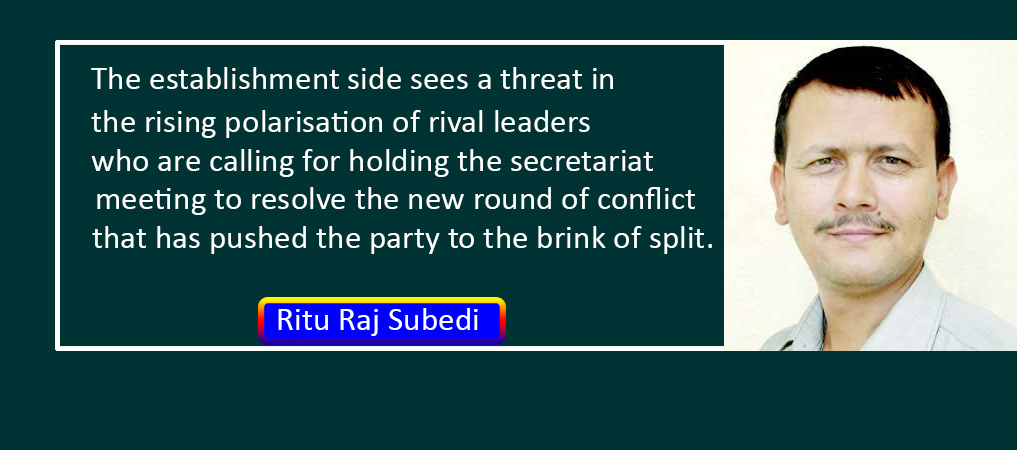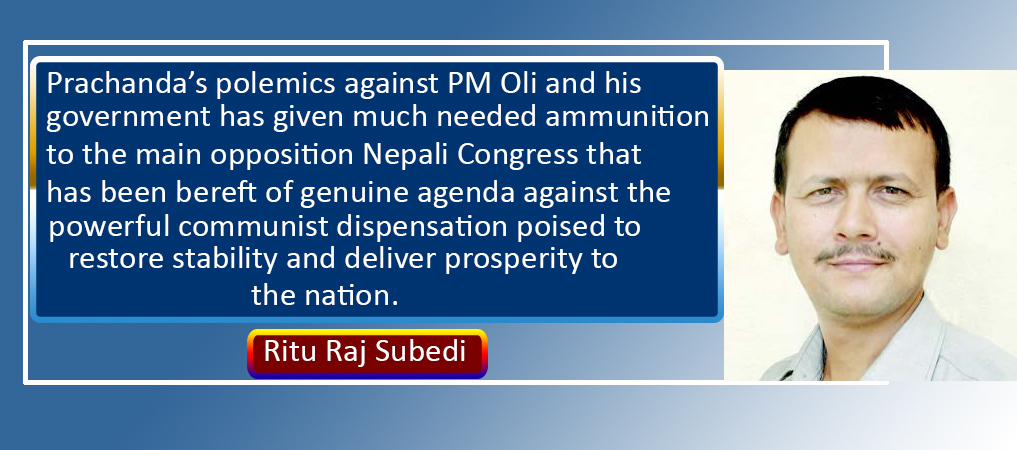UML’s Humdrum Jamboree
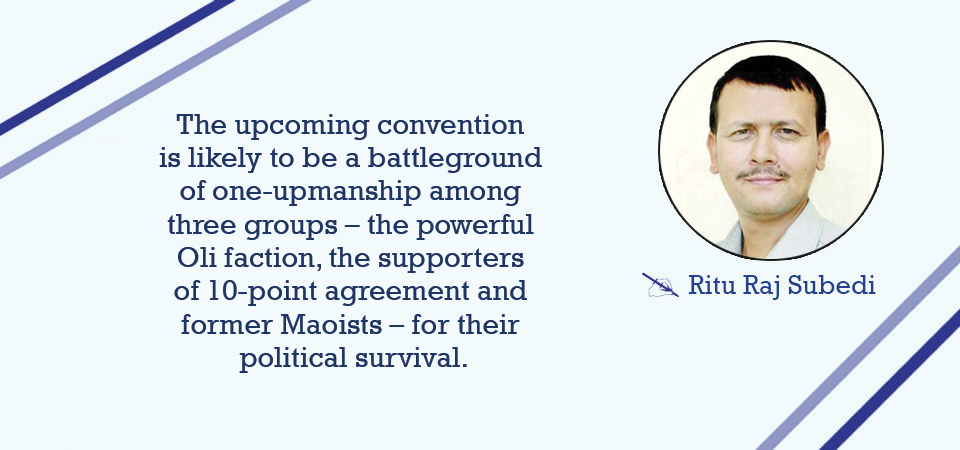
Ritu Raj Subedi
Amidst the organisational decline and ideological decay, main opposition CPN-UML is holding its 10th convention in Chitwan this weekend (Nov 26-28). As its statute convention, organised sometime back in Lalitpur, had settled party principle and structure, the UML jamboree will primarily concentrate on electing new leadership for the next five years. It is a foregone conclusion as to who will be the new chair of the party. Incumbent chair KP Sharma Oli has emerged as an unchallenged leader with his rivals Madhav Kumar Nepal, Jhalanath Khanal and Bamdev Gautam quitting the party.
The national conclave to be attended by over 1,900 delegates is taking place after its power was saturated and impressive presence in the parliament rendered irrelevant. Indisputably, it will be one-man show of Oli where his loyals will compete to ingratiate themselves to him for being elected to the important party posts.
The attending delegates are not expected to raise a question as to why the House of Representatives (HoR) – where the undivided UML had 121 seats and the communist forces commanded near two-thirds majority – was dissolved twice by Oli himself. During the statute convention, this issue was not debated for those who stood against it had already left the party to form a new one. Until and unless the UML functionaries try to get a logical answer to the dissolution, the national meet will be confined merely into a venue for leisurely chit-chat, get-together, and taking selfies and wefies.
New round of instability
The House dissolution triggered a new round of instability and posed a question to the ability of Nepali communists to deliver stability, development and good governance despite having the sweeping electoral mandate. The resounding victory of the then Left Alliance of UML and CPN-Maoist Centre in the 2017 three-tier polls capped the achievements of struggles and sacrifices of Nepali communists spanning more than seven decades but the dissolution turned the historic gain to dust at one go. In his political report presented at the statute convention, Oli attributed the House dissolution to the intra-party conflict but it was an incomplete and deceptive reply. Terming it unconstitutional, the Supreme Court reinstated the House to safeguard constitution and democracy but the dissolution had already caused a colossal damage to the communist movement - the NCP was disbanded, Oli was unceremoniously ousted from power and UML suffered division.
Oli became the biggest loser of his own whimsical move. In addition to getting kicked out of federal government, the UML lost its governments displaced in four provinces. In two provinces, its splinter - CPN-Unified Socialist – leads the government much to UML’s chagrin. The UML cadres are attending the conclave in the backdrop of this political humiliation and anguish. Will they make a soul-searching of this embarrassing situation or just indulge in blaming those who revolted to constitute the Unified Socialist? Communists are supposed to have critical consciousness and do not fear protesting the wrong decisions of leadership for they are taught to be objective, scientific and dialectical to analyse the political dynamics and developments.
While the House dissolution coupled with the deepening factional feud led to the eventual party split, the UML now confronts ideological vacuum, too. Going by the party documents, its guiding principle is People’s Multiparty Democracy (PMD), which was propounded by late Madan Bhandari and adopted in the fifth convention held in Kathmandu in 1993. PMD has drawn a lesson from the collapse of Soviet-styled socialism and attempted to check its knock-on effects on Nepal through the ‘creative use of Marxism.’ However, PMD’s political objectives have been accomplished with the Janaandolan-II that paved the way for the abolition of monarchy and establishment of federal republican system.
The party’s 8th convention declared that the new-democratic revolution had been completed and Nepal entered into initial phase of socialist revolution. It has analysed that the character of capitalism is of comprador, and called for forming national capital to put the country on socialist path through due democratic process. Its 9th central committee was assigned to prepare a roadmap of socialism to realise ‘Prosperous Nepal, Happy Nepali’ but there was no meaningful homework regarding it. As a result, the Oli government’s snappy slogan lost steam following its premature death. The NCP, created through the merger of UML and Maoist Centre, lacked clear ideology to guide it for the socialist construction. This confusion bred the ground for rise of a comprador class and crony capitalism in the party that held sway in the leadership. Thus, the ideological crisis also factored in splitting of NCP into three blocs – the UML, Maoist Centre and Unified Socialist.
The current UML leadership has been least interested in brainstorming the ideological discourse as seen in the recent statute convention that dumped the written proposal of its deputy general secretary Ghanshyam Bhusal on prosperity and socialism without touching it. The upcoming convention is likely to be a battleground of one-upmanship among three groups – the powerful Oli faction, the supporters of 10-point agreement and former Maoists – for their political survival. Oli is facing herculean tasks of adjusting the leaders from three factions to the 15-member team of office bearers. His diehard fans want to elevate Oli as all-powerful chair like Narendra Modi of Bharatiya Janata Party of India so as to fix the problems roiling the party in the aftermath of the split.
Redundantees
The so-called third stream involving 10 leaders has been apparently dissolved. They had refused to back Nepal during the split and sided with Oli for the sake of party unity. For this, Oli had awarded some of them. It is only vice chair Bhim Rawal and Bhusal, who have been making enfeebled voice to implement the 10-point deal which the establishment has already thrown into dustbin. The remaining eight leaders have morphed themselves into Oli’s loyalists to secure their political future.
Although both the third stream and former Maoist leaders have expressed their dissatisfaction over the way the convention representatives were picked, they have lost their relevance in the new context. Oli used to pit ex-Maoists against former NCP co-chair Pushpa Kamal Dahal Prachanda and Nepal faction. After the revival of Maoist Centre and departure of Nepal from UML, they have become redundant. In fact, they are entirely at the mercy of Oli, who will preside over the waning UML for next five years with an iron fist.
(Deputy Executive Editor of The Rising Nepal, Subedi writes regularly on politics, foreign affairs and other contemporary issues. subedirituraj@yahoo.com)
Recent News

Do not make expressions casting dout on election: EC
14 Apr, 2022
CM Bhatta says may New Year 2079 BS inspire positive thinking
14 Apr, 2022
Three new cases, 44 recoveries in 24 hours
14 Apr, 2022
689 climbers of 84 teams so far acquire permits for climbing various peaks this spring season
14 Apr, 2022
How the rising cost of living crisis is impacting Nepal
14 Apr, 2022
US military confirms an interstellar meteor collided with Earth
14 Apr, 2022
Valneva Covid vaccine approved for use in UK
14 Apr, 2022
Chair Prachanda highlights need of unity among Maoist, Communist forces
14 Apr, 2022
Ranbir Kapoor and Alia Bhatt: Bollywood toasts star couple on wedding
14 Apr, 2022
President Bhandari confers decorations (Photo Feature)
14 Apr, 2022
